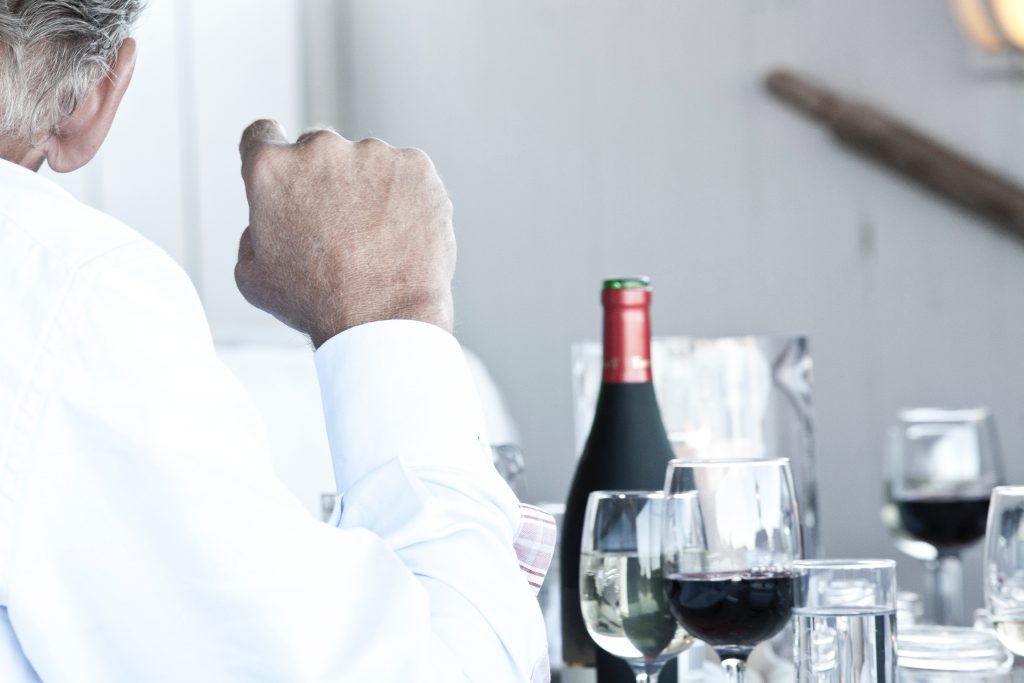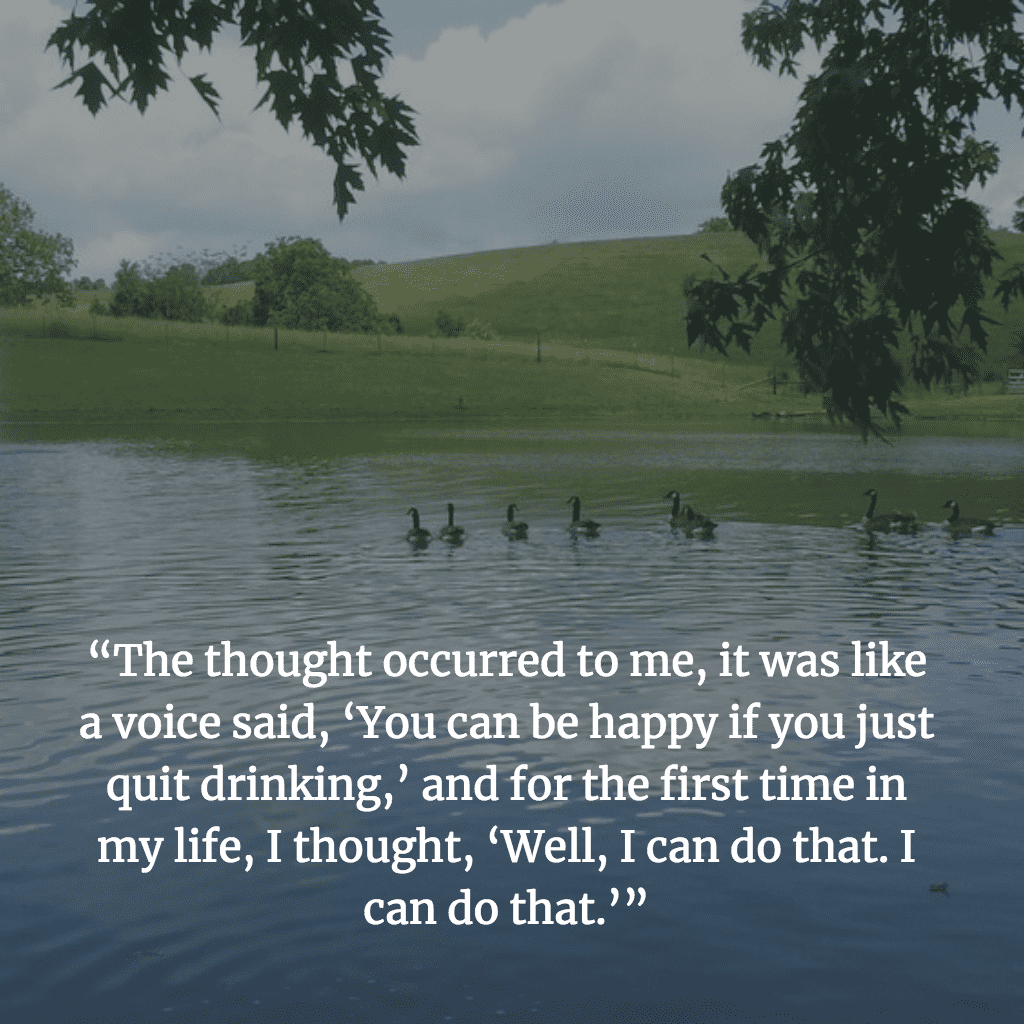It started out like the hundreds, if not thousands, of Alcoholics Anonymous meetings he’d sat through before. A clubhouse, plastic lawn chairs, crowds of seemingly happy sober alcoholics gathered together to discuss recovery. Steve was back at Discovery Place after a relapse and that morning all the guests were taken to a meeting in Nashville.
Steve couldn’t stay sober. He’d check in to Discovery Place, stay for 30 days, and drink the day he commenced. Check back in, sober up, drink again. He wanted to get sober but not more than he wanted to drink.
But Steve had started praying recently. Not prayers to get sober but rather prayers to want to want to get sober. “I was praying just to let the 51 percent side be the side that emerges,” he recalls.
Then that morning in the clubhouse, as Steve looked around the room, something started to happen to him. Something in him started to change. No one would believe him later when he described it, but they believe him today. He was starting over, and this time things would never be the same.
Nearly dead by 30
Steve grew up in Knoxville, Tenn., the second oldest of four children. He remembers being a child who couldn’t wait to be an adult. As early as 13 or 14 years old, Steve was playing music at local fraternity parties, drinking beer and hanging out with older kids. The consequences of his drinking were minimal then, nothing to make him think he might have a problem. In college, however, Steve would become a daily drinker.
Following graduation, he joined the Air Force. It was 1969 and the Vietnam War was beginning to reach its final bitter end. Steve would only serve a couple of months before high blood pressure would excuse him from further service. It was in the Air Force, however, that he noticed his physical dependence on alcohol for the first time. Then it was just tightness in his vocal chords—nothing like what it would become over the next few years.
That same year, Steve moved to Nashville to be with his then-girlfriend who he would soon marry. He started teaching Spanish at a private Catholic high school, drinking each morning before class. His drinking did not go unnoticed.
“The assistant principal used to say to me, ‘Steve, you’ve got to do something about your drinking,’” he recalls. But treatment centers were few and far between in the early 1970s, and insurance didn’t cover those kind of expenses anyway. “I would say , ‘I can’t afford to,’ and he would say, ‘You can’t afford not to.’”
Steve was fired from his job after seven years. “They had to. I couldn’t get there on time. My physical addiction was so bad I couldn’t write on the board,” he says. “It was just a matter of time.”
By then it was 1977 and Steve knew something had to be done. He was drinking at least 40 ounces of vodka a day and severely physically dependent on alcohol. Within 12 hours of deciding to quit cold turkey, Steve experienced a series of seizures which landed him in the hospital and nearly killed him. He was just 30 years old.
Older, but not wiser

Then, in 1994, on a trip to Paris, Steve had an idea.
“I formulated my theory on how it doesn’t count if you’re out of the country. I figured it’d be OK to drink while ,” he says. “Turns out, it’s not.”
Steve stayed more or less drunk for the next 14 years. While it took a couple of years after he started his relapse for the consequences to really pile up, in the end they became worse than they had been before he got sober the first time.
He was fired from another job and started attending an intensive outpatient program in Nashville. (“I was sober for four hours, three nights a week,” he jokes.) There were multiple DUIs and trips to the hospital. His wife, whose job for the federal government had her traveling for months at a time, tried to get him to take Antabuse but he’d stop as soon as she left for another work trip. After his last DUI, a judge told him he’d face several months in jail if he picked up another one.
“ was killing me, and I knew it,” says Steve. “It was a nightmare. Nothing would have gotten me out of this except God.”
He reached out to a friend who recommended Discovery Place. No stranger to twelve-step recovery, Steve liked Discovery Place’s approach and the emphasis on spirituality. These were people he felt like he might actually listen to when they talked.
But the 51 percent was still on the wrong side for Steve. He still wanted to drink more than he wanted to get sober, and each trip to Discovery Place was followed by an immediate relapse.
At 62, Steve checked into Discovery Place for the fourth time.
Sober and happy
Steve calls it being “struck sober,” the experience he had that morning in the A.A. clubhouse during his last stay at Discovery Place. “Things started getting out of focus and a sense of warmth came over me, a sense that I was looking at myself,” he recalls. “I don’t know, I just saw very clearly how alcohol really played a terribly destructive role in my life from the beginning. Not every time, but it was progressive and going to kill me.”
To Steve, everyone else in the room that morning looked happy. “The thought occurred to me, it was like a voice said, ‘You can be happy if you just quit drinking,’ and for the first time in my life, I thought, ‘Well, I can do that. I can do that.’”

“I expected the next day to wake up and feel like I couldn’t wait to get out of so I could get a drink,” he says, “but it was just gone.” That was nine years ago and Steve hasn’t had a drink since.
Now 71, after 17 years of sobriety, a 14 year relapse, and another nine years of sobriety, he jokes that no one is ever too old to get sober: “We’re alcoholics. We never grow up.” And he’s certain today sobriety is the best way of life for him.
“It’s a waste of time to wish things were another way. If you’re going to have a successful life, everything’s got to change. There’s no ‘I’ll get over this, and I’ll learn to manage my drinking.’ That ain’t happening.”

